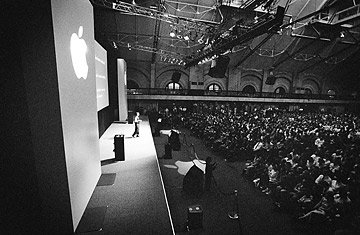
Boston's 1997 MacWorld Expo listens to Jobs on stage.
(6 of 7)
As important as the iPod was, it was ultimately just a high-tech Walkman. The iPhone, unveiled at a Macworld Expo keynote in 2007, was something far more: a powerful personal computer that happened to fit in your pocket. "Every once in a while, a revolutionary product comes along that changes everything," Jobs said in introducing it. It was a statement that would have been hype from anybody else; in this case it was merely true. The boldness of what lay behind that sinister black glass face is easy to miss: in one fell swoop, Jobs brought to market a new touchscreen technology and an entirely new interface to match it. It instantly made every other smart phone on the market look like an antique.
For Jobs, this wasn't just business; it was personal. He'd been thrashed by Microsoft in the PC market, but now, in the consumer-device market, he would win it all back, and he did. Typically, he responded not by aping the strategy that had worked so well for Microsoft the first time around but by being even more like Steve Jobs. Like the first Mac, the first iPhone had obvious deficiencies. For instance, it shipped with a poky 2G wireless connection just as 3G was becoming pervasive. But its software design was such a radical improvement over anything anyone had ever seen that it didn't really matter.
The other piece of the puzzle was control. In Apple, Jobs had built a corporation that was truly an expression of his obsession with it. Whereas most companies specialized in hardware or software or operating systems or retail or consumer electronics, Apple did them all at once: it controlled what Jobs called "the whole widget." Once you owned an Apple device, you filled it with movies, music and apps from Apple's online stores. Jobs had created a closed technological universe of gleaming Copernican perfection, and everybody wanted to live there. Jobs had realized that building products to play nicely with those of other companies was all well and good--that was the Microsoft way--but to really get it right, you had to build everything yourself.
The idea was counterintuitive and practically un-American, but the marketplace proved Jobs right. The iPhone had serious competition, especially from handsets that used Google's Android operating system. But the iPhone ecosystem--phone plus apps, movies and music delivered through Apple services--contributed to Apple's success in a way no other company could match. By 2011, Apple was selling roughly 210,000 iPhones a day and, according to one analyst, capturing two-thirds of the industry's profits.
In 2010, Apple followed up the iPhone with the iPad, its first effort in a category, tablet computers, that had existed for two decades without a single hit product. It was a classic example of Jobs' modus operandi: every company had a tablet, but only Jobs saw what they had. He didn't invent it, but he reinvented it. According to Jobs, Apple sold more than 15 million iPads in the product's first year, a number that dwarfed the predictions of Wall Street analysts.
